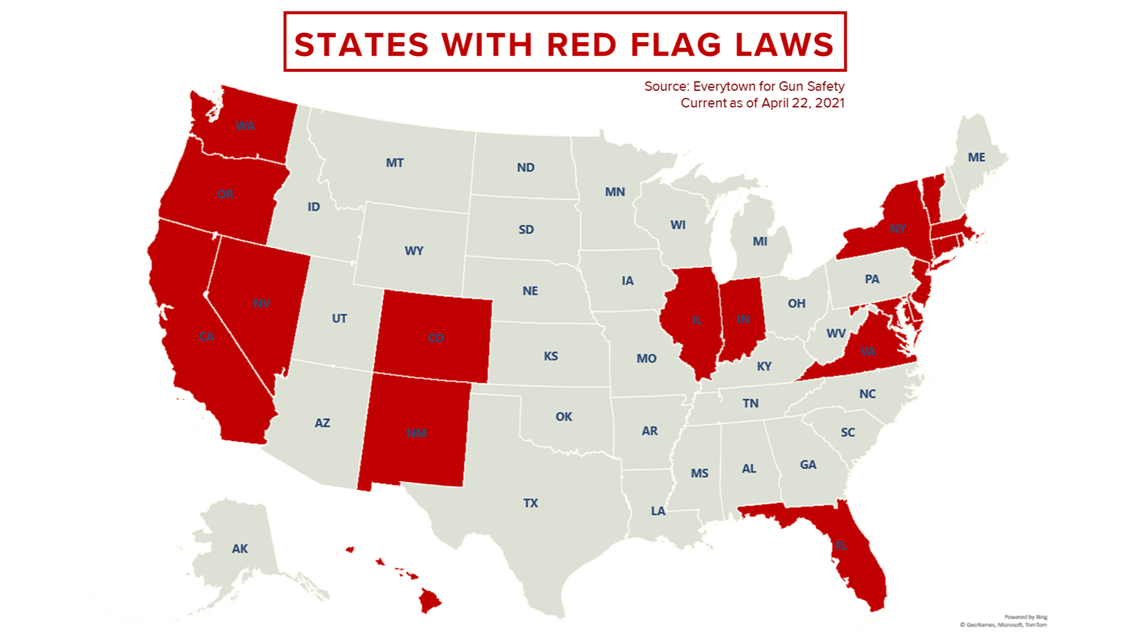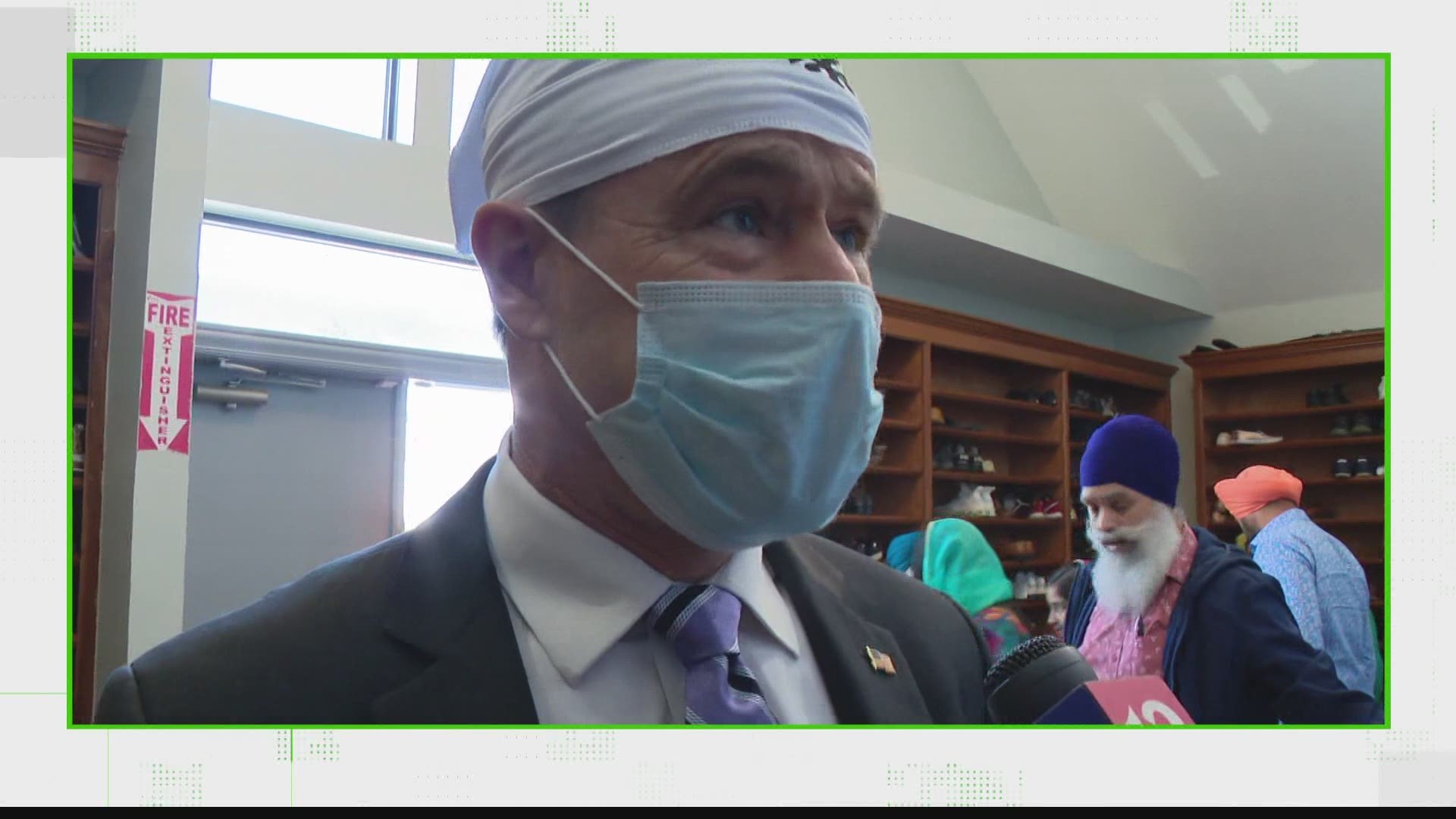INDIANAPOLIS — Indiana’s “red flag law” is the focus of much scrutiny since the deadly shooting at the FedEx Ground facility in Indianapolis. Critics and supporters focus on how it works, whether it could have been applied in a way to prevent the violence at FedEx and whether changes are needed.
Marion County prosecutor Ryan Mears held a press conference and explained several loopholes and problems he sees with the current law. Local police and the FBI had past interactions with the teenager investigators say is responsible for the shooting, and the Marion County Prosecutor’s Office had considered using the red flag law to ask a court to limit his access to firearms.
Mears explained why his office did not pursue a court order, and Mears detailed some of his frustrations with the law.
“There's a significant limitation to the law,” Mears said.
When U.S. Senator Todd Young (R-Indiana) attended a vigil to honor the eight people killed and those injured, he told 13News, “Indiana has the strongest red flag law in the country.” The WTHR VERIFY team wondered if that is the case.
QUESTION:
Does Indiana have the strongest red flag law in the country?
THE SOURCES:
Dr. Jody Madeira – Professor with the Indiana University Maurer School of Law, who is an expert on Second Amendment issues.
Michael Lawlor – Associate Professor of Criminal Justice at University of New Haven. He helped write the nation’s first red flag law as a representative in the Connecticut legislature.
Everytown for Gun Safety – A non-profit organization that tracks gun laws across the country.
Brady – A non-profit organization formerly known as the Brady Campaign to Prevent Gun Violence.
BACKGROUND:
First, a little bit of context and background on the laws.
Extreme Risk laws are commonly known as “Red Flag” laws. The basic premise is to create a way for someone, typically a family member or law enforcement, to ask a court to issue an order to temporarily prevent someone from accessing a firearm if they are deemed to be a danger to themselves or to others.
Indiana is one of 19 states with current red flag laws.


Connecticut passed the country’s first red flag law in 1999 after a workplace shooting.
In 2005, Indiana passed the second such law after Indianapolis police officer Jake Laird was shot and killed by a man with a history of mental illness, and as a result, Indiana’s law is also known as the “Jake Laird Law."
Other states added similar laws starting in 2016, according to the gun-safety advocacy group, Brady. A number of states enacted Extreme Risk laws in the wake of the 2018 shooting at Marjory Stoneman Douglas High School in Parkland, Florida.
WHAT WE LEARNED:
How strong a law is can be subjective and can depend on which aspect of the law that you consider, but the experts VERIFY spoke with say Indiana’s law is not the strongest.
Lawlor said, “It does not appear that way.”
Madeira said, “Indiana's red flag law is adequate, but I would not characterize it as strong. And it is broadly skewed towards protecting gun rights and not public safety.”
They point to several issues as reasons why red flag laws in other states are stronger.
“I think that one critical weakness that the Indiana law has always had is that it hasn't sealed the loophole that prevents people from buying firearms while a red flag proceeding is pending,” said Madeira.
When a prosecutor begins the process of asking a judge to remove a weapon from or prevent someone from acquiring more firearms, nothing prevents that person from purchasing more guns while the case moves forward. That allows a person who may be a danger to themselves or others to replace a weapon that was confiscated.
“That’s not the case in Connecticut, for sure," Lawlor noted, as he explained that other states prevent the subject of a red flag case from purchasing weapons.
“When the guns are seized in Connecticut, and someone…has a court date to be added to the red flag law, in that interim, they are prohibited. They cannot go out and buy a gun.”
Lawlor also noted an aspect of the state’s gun purchase law that makes it easier to stop a firearms purchase.
Connecticut requires that someone purchasing a gun pass the federal background check, like happens in Indiana, but in Connecticut, someone buying a gun needs a credential issued by state police. Lawlor said when a gun is seized and a red flag case started, that state police credential is immediately revoked.
Another reason Madeira said other state laws are stronger has to do with who can ask the court to take away guns from a person who is dangerous or mentally ill.
“These other states, like California, Oregon, etc., family members or friends can directly petition to court,” she said. She notes that they are often in the best positions to know when a person is likely to be dangerous.
By contrast, Indiana, “They have to contact law enforcement, they can't file a petition directly.” A family must reach out to law enforcement to get the process started.
California was the first state to include a provision in its law allowing family and friends to file a petition, and Madeira said California’s Extreme Risk Law is now the model for legislation. In 2019, California added a provision that allows an employer or co-worker to seek a red flag petition, as long as the co-worker has substantial and regular interaction with the person of concern.
Madeira notes that both California and New York allow teachers and/or school administrators to petition the court under certain circumstances.
“I think that Indiana was a leader with having a red flag law [when it was passed] but, of course, laws should remain changeable with the times. They should respond to loopholes that circumstances reveal," Madeira said.
She also notes that Indiana does not have a way to seek orders to seize firearms after business hours and on weekends.
VERIFY did reach out to Young’s office to see if he wished further clarify his comments. A spokesperson responded, “The crux of Senator Young’s statement was that Indiana has a law in place that could have prevented this tragedy, which is true whether or not the law is considered the strongest in the country.”

